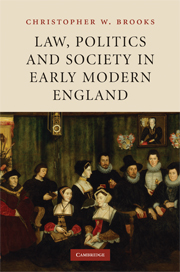Book contents
- Frontmatter
- Contents
- Preface
- Abbreviations and conventions
- 1 English history and the history of English law 1485–1642
- 2 Courts, lawyers and legal thought under the early Tudors
- 3 The initiatives of the crown and the break from Rome
- 4 Political realities and legal discourse in the later sixteenth century
- 5 The politics of jurisdiction I: the liberty of the subject and the ecclesiastical polity 1560 – c. 1610
- 6 The politics of jurisdiction II: multiple kingdoms and questions about royal authority
- 7 The absoluta potestas of a sovereign and the liberty of the subject: law and political controversy in the 1620s
- 8 The degeneration of civil society into a state of war 1629–1642
- 9 Law and ‘community’
- 10 The aristocracy, the gentry and the rule of law
- 11 Economic and tenurial relationships
- 12 The household and its members
- 13 The person, the community and the state
- 14 Conclusion
- Manuscript bibliography
- Index
- References
9 - Law and ‘community’
Published online by Cambridge University Press: 06 July 2010
- Frontmatter
- Contents
- Preface
- Abbreviations and conventions
- 1 English history and the history of English law 1485–1642
- 2 Courts, lawyers and legal thought under the early Tudors
- 3 The initiatives of the crown and the break from Rome
- 4 Political realities and legal discourse in the later sixteenth century
- 5 The politics of jurisdiction I: the liberty of the subject and the ecclesiastical polity 1560 – c. 1610
- 6 The politics of jurisdiction II: multiple kingdoms and questions about royal authority
- 7 The absoluta potestas of a sovereign and the liberty of the subject: law and political controversy in the 1620s
- 8 The degeneration of civil society into a state of war 1629–1642
- 9 Law and ‘community’
- 10 The aristocracy, the gentry and the rule of law
- 11 Economic and tenurial relationships
- 12 The household and its members
- 13 The person, the community and the state
- 14 Conclusion
- Manuscript bibliography
- Index
- References
Summary
Persons and polities
Focusing often on debates in parliament, or well-known trials before the royal courts in London, the first half of this book concentrated on the legal dimensions of political, religious and ‘constitutional’ debate. It also showed that the legal discourses constituting these debates were refracted back into the localities in literally thousands of speeches before country squires, farmers and citizens. Nevertheless, when we turn away from high politics at Westminster, it is difficult to determine how juristic values resonated in provincial England. Direct evidence about the reception of legal language is limited. In any case discussions of the royal prerogative do not necessarily tell us all that much about the legal matrix within which people of vastly different levels of affluence earned their livings, raised their children, or interacted on the streets. Yet, just as early Stuart political and religious controversies were very often played out before judges, so too the great wave of litigation characteristic of the period brought a wide range of issues, stretching nearly from the cradle to the grave, into the courts and consequently into the law reports or readings that were given at the inns of court and chancery. The gap between metropolitan high politics and the provincial ‘politics of the parish’ is perhaps more readily bridged through legal materials than almost any other kind of source.
- Type
- Chapter
- Information
- Law, Politics and Society in Early Modern England , pp. 241 - 277Publisher: Cambridge University PressPrint publication year: 2009



